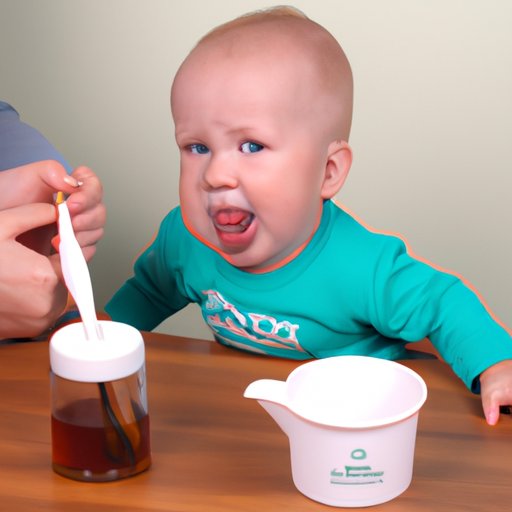
I. Introduction
One of the most challenging tasks for parents or caregivers is getting toddlers to take medicine. Toddlers are notoriously difficult to medicate. They may refuse medicine because it doesn’t taste good, because they are feeling scared or anxious, or simply because they don’t want to take it. If you are struggling to give your toddler medicine, there are several ways to make the experience as stress-free and effective as possible.
II. Mix the medicine with their favorite drink or food
Mixing medicine with your toddler’s favorite drink or food is a great way to get them to take their medication. Before mixing, check with a doctor or pharmacist to ensure that the medicine is safe to mix with food or drink. Use a small amount of the chosen food or drink to mix the medicine and be sure to mix it carefully to avoid lumps or clumps. Some good options for mixing medicine include fruit juice, applesauce, or yogurt.
III. Use a medicine dropper or syringe to administer the medicine slowly
Using a dropper or syringe to slowly give medicine is another helpful strategy. It can be challenging to get toddlers to take large amounts of liquid medicine, especially if they don’t like the taste. Slowly administer the medicine using either a dropper or syringe. This approach allows you to control the amount of medicine your child receives and minimizes the risk of choking or vomiting. Consult with a doctor or pharmacist before administering medicine using this technique to ensure that it is safe.
IV. Offer a reward for taking the medicine
Offering your child a reward for taking their medicine can be an effective method to encourage them. Choose a reward that your toddler will find motivating but make sure that it is not something that will distract them from completing the task at hand. Small rewards like stickers or praise can be effective in encouraging your child. Ensure that you are consistent in your reward-giving and avoid over-rewarding your child.
V. Give the child choices during the medicine-taking process
Offering your child choices during the medicine-taking process can also be helpful. This approach gives toddlers a sense of control and autonomy. However, make sure that you keep the choices limited and age-appropriate. For example, you could offer a choice between taking medicine before or after a snack or a choice between using a syringe or a spoon.
VI. Distract the child with song or game
If your toddler is feeling shy or anxious about taking their medicine, distracting them can be effective. Play a game or a song during the medicine-taking process to make the process less intimidating. Choose a game or song that your toddler enjoys and make sure that they are willing to engage in the activity. Note that some toddlers may still refuse to take medicine after being distracted, and it is essential to respect their choice.
VII. Explain to the child why they need to take the medicine in simple terms
Explaining why your child needs to take medication in straightforward terms can be beneficial. Toddlers may feel anxious or confused about the need for medication. Use language that they can understand and avoid overcomplicating the explanation. For example, you could say, “The medicine will help you feel better,” or “The medicine will make you strong.”
VIII. Make the experience positive
It is important to end the medicine-taking experience on a positive note. When your child completes the experience, offer positive reinforcement. Use praise and encouragement to let your child know that they did well. You could also offer them a small reward for completing the task. Keeping the mood light and happy can make the process less daunting and encourage your child to take their medicine again.
IX. Conclusion
In conclusion, getting your toddler to take medicine can be a daunting task. However, there are several strategies that can be used to make the experience less stressful and more effective. Mixing medicine with your toddler’s favorite food or drink, giving them choices during the medicine-taking process, and distracting them with games or songs are all effective techniques. Remember to explain the importance of medication in simple terms and reward your child for completing the task. Seek advice from medical professionals if you require further guidance.





